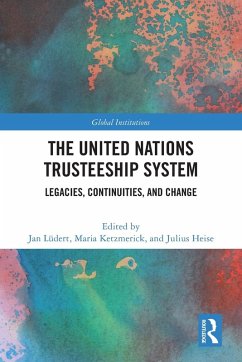This book considers the past and present legacies, continuities and change of the United Nations Trusteeship System by assessing consequences and legacies of decolonization in contemporary society, international organizations and international politics. International contributors address the UN Trusteeship System as a venue for multiple state and non- state actors and its effect on the international system. Rather than viewing UN trusteeship as a bygone phenomenon, the volume underscores its current relevance, particularly in view of the recent resurgence of trusteeship models such as in Kosovo and East Timor. Offering a novel and robust, yet simple and intuitive analytical framework through which to understand a broad range of cases related to the Trusteeship System and its impact on the international system, the book places emphasis on the agency of states in the Global South and highlights the importance of multiple actors in global governance. It will be of interest to scholars of international relations theory and history in a variety of fields, ranging from African Politics to Intergovernmental Organizations and Comparative Politics.
'The United Nations Trusteeship System offers a compelling global exploration of the phenomenon of trusteeship in the second half of the twentieth century. Building on an extensive body of scholarship on the United Nations Trusteeship System, these scholars elucidate important continuities with the past but also critical resonances with the present. The chapters in this volume expertly navigate between the global and the local and offer historical perspectives from both Western actors and the inhabitants of trust territories. This book will be essential reading for anyone looking to understand the history of the United Nations as well as scholars and students of European colonialism and decolonization in the twentieth century.'
Jessica Lynne Pearson, Macalester College, USA
Jessica Lynne Pearson, Macalester College, USA

